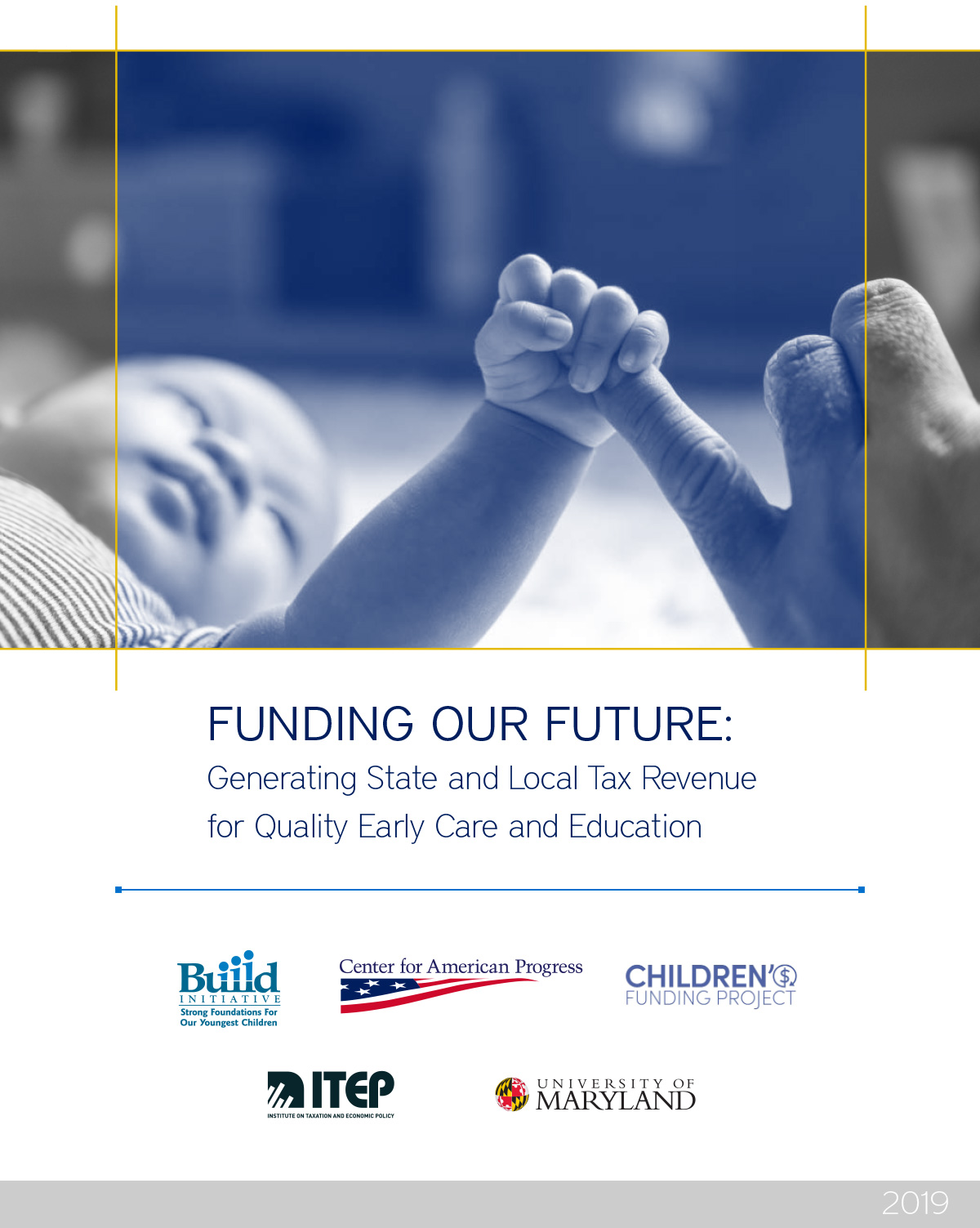Policymakers increasingly understand the importance of expanding the availability of quality early care and education for young children. In good news, this funding has been supported by both parties in a deeply partisan House and Senate. Moreover, during the course of the 2018 gubernatorial races, multiple candidates declared commitments to early education. New governors, vocal about the importance of children’s earliest years, have since proposed investments for early childhood in their budgets, codifying their commitment to early childhood development and the science behind it.
 However, despite these proposed investments, there is still a sizeable gap between the funding available and the level of funding needed to bolster much-needed supports for our nation’s youngest learners. A recent report, Funding Our Future: Generating State and Local Tax Revenue for Quality Early Care and Education, catalogues successful examples of how state and local tax revenues have been used to support early care and education, filling the gap with these previously untapped funding streams. For example, this revenue is having a significant impact on long-term goals, as seen in the local children’s taxing districts in Florida or the new approach to corporate and business taxation in Oregon.
However, despite these proposed investments, there is still a sizeable gap between the funding available and the level of funding needed to bolster much-needed supports for our nation’s youngest learners. A recent report, Funding Our Future: Generating State and Local Tax Revenue for Quality Early Care and Education, catalogues successful examples of how state and local tax revenues have been used to support early care and education, filling the gap with these previously untapped funding streams. For example, this revenue is having a significant impact on long-term goals, as seen in the local children’s taxing districts in Florida or the new approach to corporate and business taxation in Oregon.
The report also outlines new, “next generation” tax policy ideas to bridge the funding gap.
Expert Guidance on Funding Strategies
In 2019, tax experts and seasoned early childhood leaders came together to identify a range of potential tax policy areas to introduce to state and local leaders with a focus on expanding high-quality early care and education, especially for infants and toddlers.
The Child Care Revenue Work Group, supported by the Pritzker Children’s Initiative and the Robert Wood Johnson Foundation, identified seven tax areas that state and local early childhood leaders can consider. For example, some states are using sales taxes, taxes on large corporations and set-asides of property tax revenue to help bridge the funding gap. The Work Group identified both approaches that have worked in the past, and innovative ideas that could be considered by early childhood leaders to generate revenue for investments in early childhood programs. Due to the diversity of the tax environments in this country, the report outlines how each idea can be implemented in a variety of tax climates.
Guiding Questions for Identifying Funding Streams
Although tax policy varies across the country, the Child Care Revenue Work Group identified nine Guiding Questions to support conversations among leaders when evaluating potential sources of funding for child care. The questions are designed to test the legal, administrative and political feasibility of these tax policies within state and local contexts. For example, policymakers must determine not only what entity will levy the tax; they also must consider whether the tax is legally feasible, whether the funds can be dedicated solely to early care and education, and how the additional revenue fits into a near- and long-term strategic plan for early care and education.These essential questions can reveal whether a revenue generation policy may be appropriate for a particular community, can help communities think strategically about how these policies can contribute to intentional change and may contribute to improved access to high-quality early care and education.
Resources to Evaluate Potential Funding in Your Local Context
This report provides early care and education leaders with tools and insights to examine the facets of taxes and tax policy that can generate funding strategies for quality early care and education, highlighting examples from across the country of states and communities that have implemented tax policies that support children birth through five, generating revenue that is positioned to promote healthy communities and thriving families.
Working in cooperation with others who bring different perspectives and expertise to the work will make it possible to determine whether the tax areas covered in the paper are relevant within particular state and local contexts. Early childhood leaders can take away practical lessons from examples of how other states and localities have used dedicated tax revenue to support the accomplishment of long-term early care and education goals.
For More Reading:
- Access the Funding Our Future report here.
- Access the At A Glance report here.
- Early Learning Nation: Read how Kent County, Michigan, Galvanized Voter Support for Early Childhood Services
- Early Learning Nation: Learn how Onandaga County, NY, Created a Replication-Worthy Master Class in Cross-Sector Coalition Building

Harriet Dichter
Harriet Dichter provides leadership as part of Early Education Services for ICF. She has extensive experience in innovation, partnership and accountability in early childhood at the local, state and national levels. As Pennsylvania's founding deputy secretary for the Office of Child Development and Early Learning, she gained national attention for the state's unique new solutions and partnerships. She also was the founding executive director of the Delaware Office of Early Learning, where she accelerated the pace, quality and accountability of the state's comprehensive work in early childhood.
Nationally, she served as a leader for the Ounce of Prevention Fund and its policy advocacy affiliate, the First Five Years Fund, and has worked as staff at the Pew Charitable Trusts. At the community level, she developed her policy, planning, implementation and advocacy skills in organizations ranging from United Way to a child policy and advocacy nonprofit.
She is a graduate of Yale University and the University of Pennsylvania Law School.



